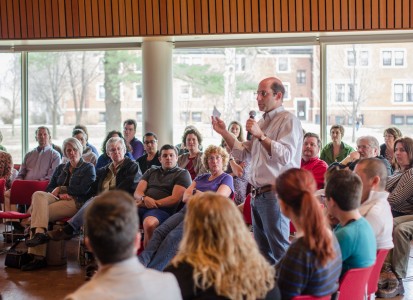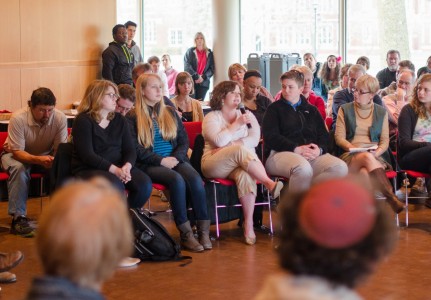Editor’s note: Due to a respect for the safe space environment promised at this week’s town hall sessions, the names of participants quoted in this article are held unless permission was explicitly given.
Two town hall sessions in JRC 101 on Wednesday, April 23 addressed the topic of “work-life balance,” inviting students, faculty and staff to share their concerns and solutions about the culture of stress and work at Grinnell. The first session, held at noon, was well-attended by a variety of students, faculty and staff, while the second session, held at 7:30 p.m., had a stronger student presence.

Photo by Shadman Asif.
Work-life balance was one topic identified as important by students earlier this year through a campus-wide vote. Previous town halls have covered technology, diversity and inclusion and environmentalism.
“Because work-life balance was the one that people were most interested in, we made it our last [town hall meeting],” said SGA Diversity and Outreach Coordinator Clare Mao ’14.
Both sessions were moderated by SGA Vice President for Student Affairs and President-elect Opeyemi Awe ’15 and Vice-President for Communications Jim Reische, who started off the conversation by encouraging attendees not to be afraid to share their views.
“If we don’t have an honest, open conversation, nothing happens,” added Ombudsperson Chinyere Ukabiala, who was in attendance.
A prominent topic from the noon session involved student workload.
One student participant found it helpful when professors communicated with their students and took a “barometer of the class, stress-wise,” adapting their class assignments to the stress level of their students.
A faculty member from the Biology Department also expressed concern about the amount of work that students do.
“We vary a great deal in how much work we expect our students to do,” the professor said, noting that courses may share the same title, but assign variable amounts of work.
The faculty member also explained the pressures that junior faculty face in balancing how much work they should assign to students.
“[When reviews come around, professors] don’t want to be viewed as a hard-ass by students … but [also don’t want to be] viewed as not very serious by their peers. I would like a discussion as to what the reasonable expectations are,” the professor said.
A staff member in attendance at the noon session shed some light on how the staff member hoped the balance between work life and family life could be respected for staff members.
“Supervisors need to understand that while we are here we give 100 percent, but while we are not here, our families need 100 percent. We need to come to a realization of that,” the staff member said. “I would challenge senior staff and senior leadership to model that same behavior.”

Photo by Shadman Asif.
Other participants echoed this sentiment, citing late-night deadlines and work emails as sources of their work stress.
Another topic of conversation was Grinnell College’s culture of busyness.
One staff member at the noon session mentioned that there is a pressure on campus for people to feel busy.
“We’re always sort of talking about how busy we are and not talking about the ways we take care of ourselves,” she said. “It creates a high pressure of feeling busy. This creates stress on both ends of the spectrum.”
Another staff member added that this stress of constant work may come from the pressure to get as much value from the College as possible.
“The commodification of education also plays in work-life balance,” the staff member said. “[There is this] stress to get as much as possible from the price you’re paying. Faculty [also have] the pressure to deliver on services that students are paying for.”
At the 7:30 session of the town hall meeting, which had a larger student attendance, students also offered explanations as to why Grinnell has a culture of busyness.
“I feel like students at institutions like Grinnell … feel like we need to prove that we’re smart enough to be there, to stay here,” said Dan Davis ’16, a Student Adviser. “It can sometimes be an issue for us. As much as we want [help], we don’t want to look like we need it.”
Faculty and students mentioned little things that could change the perception of Grinnell’s busy and stressful culture.
“If you call Finals Week “Hell Week,” even if it’s not hellish for you, you’re going to think it’s hellish. I think we need to change that,” said Mary Zheng ’15.
Assistant Director of Service Learning and Engagement Susan Sanning said that the faculty and staff’s Halogen Appraisal System should be changed in order to lessen the pressure to overachieve.
Faculty and staff members of the College are required to self-evaluate through the Halogen software program, which asks participants to rate themselves under the following categories: Below Expectations, Meets Expectations, Exceeds Expectations or Exceptional.
In a separate interview, Sanning expanded on her opinion of the self-appraisal form.
“The ways we do the annual review process [are] actually institutionalized in the sense that not only do you have to meet the expectations, [and] not just exceed them, but you have to supersede them to be considered top notch,” Sanning said. “And so if you do that each year, you have this balloon that keeps going … and eventually it’ll pop. This annual review process is contributing to this ‘busy, busy, busy’ culture. My question is, how can we change it so that it promotes balance?”
Towards the end of the session, faculty and staff mentioned resources that everyone could reach out towards whenever they are feeling stressed due to work.
Internship Counselor Kelly Guilbeau mentioned that the Center for Careers, Life, and Service is a safe haven for students to come and receive help in managing their stressful lives.
Ukabiala added that she will be offering workshops on email management soon. The integration and efficiency of email in everyday life sometimes encourages the stress from work to seem more overwhelming.
Awe hopes that students continue to offer suggestions on how to improve future meetings.
“I really enjoy the town halls … but they’re imperfect, and if students have any suggestion on how we can make them better, everything is on the table,” Awe said. “There is no ulterior motive behind them, it’s just to see where we are.”
Students mentioned the need for Grinnell to provide more resources to help manage their stress, and Sanning echoed their concern.
“If we’re not modeling [a balanced life] here, you’re left to do it on your own when you graduate,” Sanning said.

































































